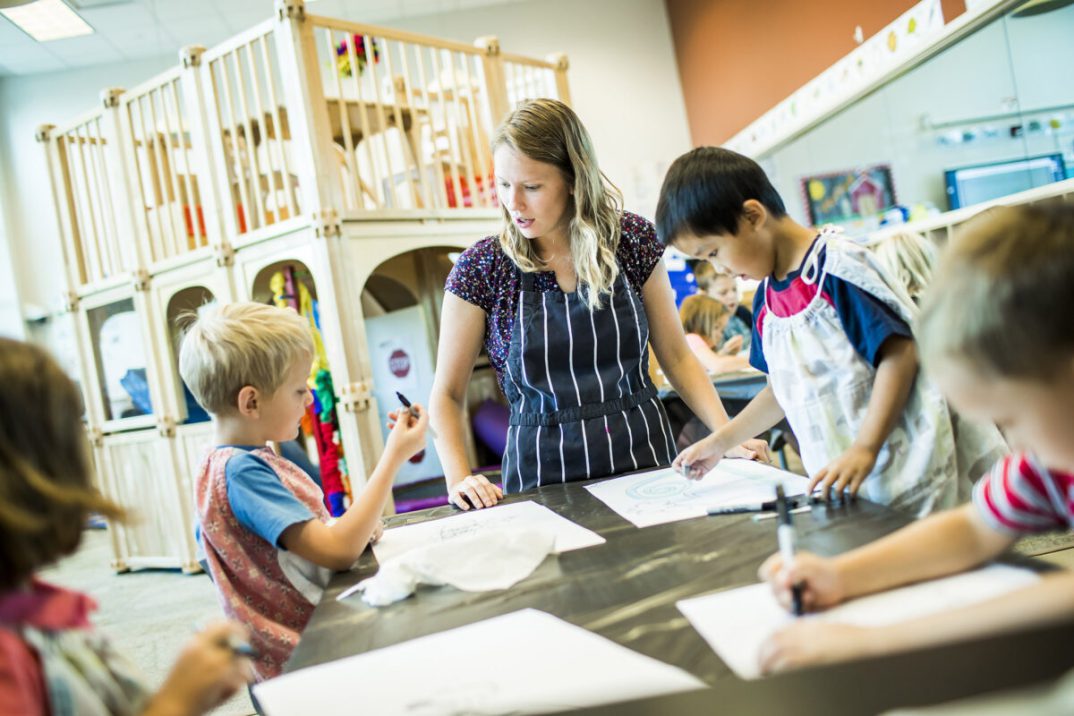Nate Edwards, BYU Photo
A BYU/Notre Dame study found that access to full-day kindergarten decreases the burden on mothers of kindergarten-aged children to provide transportation in the middle of the day, giving greater flexibility to mothers’ schedules.
As the back-to-school season sweeps across the nation, families are adjusting to a significant shift in the educational landscape: the rise of full-day kindergarten. While much attention has focused on how extended school hours benefit children academically, new research from Brigham Young University and the University of Notre Dame sheds light on another crucial aspect — how this change impacts parents, particularly mothers.
“Public school serves two purposes that are both important for kids. First, school is an investment in growth; helping a child’s cognitive development, social development and language development,” said Jocelyn Wikle, BYU professor of family life. “Another purpose is that while children are at school, parents have opportunities to use their time in other ways that can also be valuable for families.”
To understand the impact of full-day kindergarten on family relationships and time, Wikle, along with BYU economics professor Riley Wilson and Chloe Gibbs from Notre Dame, analyzed nationwide data from surveys collected from federal agencies, the Census Bureau, the U.S. Bureau of Labor Statistics and national education data. They used these different viewpoints to understand the different ways families are impacted by full-day kindergarten.
“The changes in full-day kindergarten have affected millions of children and their families,” Wilson said. “It seemed important to document how the families responded to these changes.”
The study, recently published by the Annenberg Institute, found that access to full-day kindergarten decreases the burden on mothers of kindergarten-aged children to provide transportation in the middle of the day, giving greater flexibility to mothers’ schedules. Mothers have additional time in the day to work or pursue other family responsibilities.
Full-day kindergarten can also be a form of subsidized child care, providing mothers with increased financial opportunities.
“Families with young children are juggling a lot,” Wikle said. “Moms need support during a stressful stage of parenting, and schools can provide that support through offering full-day kindergarten options.”
Their research also shows that on school days, children in full-day kindergarten only spend 57 minutes less with their mothers each day than children in half-day kindergarten. This, along with improved test scores from full-day participants, seems to negate many concerns about full-day kindergarten.
“Overall, full-day kindergarten relaxes time constraints for moms and allows them to spend their time differently,” Wilson said. “On average, this means spending more time working but not necessarily less time engaging in high-quality activities with children such as reading together, one-on-one time or physical care for the children.”
Wikle says she hopes school administrators, parents and families consider this research as a reference point to help each family make the right choice for their situation. She noted the positive outcomes of full-day kindergarten as an added option for families.
“The nice thing about full-day kindergarten is that in no state are parents required to use it for their children. States require school districts to provide it, but it’s still a family’s choice about whether they do half-day or full-day,” Wikle said. “This just expands choices for parents. Parents can choose their best option based on what is best for their child.”
Abigail Haven is a writer for BYU University Communications.
Newsletter
Join thousands already receiving our daily newsletter.





